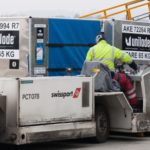Australian carrier Qantas is to cut 6,000 permanent jobs and has announced short-term plans to become a “much smaller airline.”
As well as the redundancies, Qantas will also temporarily lay off 15,000 positions associated with international operations as it struggles to survive the COVID-19 pandemic.
The airline is to ground 100 aircraft for up to 12 months and some for longer and will retire its remaining six Boeing 747 fleet immediately, six months ahead of schedule. Fleet deliveries of Airbus A321neo and Boeing 787-9 fleet have been deferred to meet the Group’s requirements.
The cost of implementing the plan is estimated at $1 billion, with most of the amount being realised during the next financial year.
Announcing the plan, Qantas Group CEO Alan Joyce said the Qantas Group had entered the crisis in a better position than most airlines and had “some of the best prospects for recovery”. But he added it would “take years” before international flying returns to 2019 levels.
“Sudden reversal of fortune is no one’s fault”
He added: “We have to position ourselves for several years where revenue will be much lower. And that means becoming a smaller airline in the short term. Most airlines will have to restructure in order to survive, which also means they’ll come through this leaner and more competitive. For all these reasons, we have to take action now.
“Adapting to this new reality means some very painful decisions. The job losses we’re announcing today are confronting. So is the fact thousands more of our people on stand down will face a long interruption to their airline careers until this work returns. What makes this even harder is that right before this crisis hit, we were actively recruiting pilots, cabin crew and ground staff. We’re now facing a sudden reversal of fortune that is no one’s fault, but is very hard to accept.
Crisis has left carrier with “no choice”
Joyce said: “This crisis has left us no choice but we’re committed to providing those affected with as much support as we can, ” said Joyce. “That includes preserving as many jobs as possible through stand downs, offering voluntary rather than compulsory redundancies where possible, and providing large severance payouts for long serving employees in particular.”
He added: “As we’ve done throughout this crisis, our decisions are based on the facts we have now and the road we see in front of us. Our plan gives us flexibility under a range of scenarios, including a faster rebound or a slower recovery.”
“Fundamentally optimistic about the future”
But Joyce added Qantas was “fundamentally optimistic about the future.” He said almost two-thirds of pre-crisis earnings were from the domestic market with distance within the country making air travel an essential. He added the domestic market was likely to recover faster than the Group’s international routes and that the Group included the leading full service and low fares airlines in Australia.
He added: “We still have big ambitions for long haul international flights, which will have even more potential on the other side of this.”

